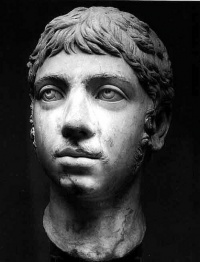Fictional portrayals of psychopaths
From The Art and Popular Culture Encyclopedia
|
"To the creator of films as well as other forms of literature, the dark side of human nature has often proved more rich and interesting than the bright. Films and books on the lives of saints have not been as popular as murder mysteries and works of horror. While we may have no desire to experience them in our own lives, terrible deeds and evil people exert their perverse attraction on our psyches. We who consider ourselves moral and upright are often fascinated by the behavior of the pitiless, merciless, and guiltless psychopath. Like a magnificent black panther: powerful, dangerous, and alien, the psychopathic character can have a dark, perfect beauty that simultaneously attracts and repels us." --Gordon Banks[1] |

Illustrated by the head of Elagabalus, one of the five "mad emperors" of ancient Rome

Illustration: Portrait fantaisiste du marquis de Sade (1866) by H. Biberstein
|
Related e |
|
Featured: |
Psychopaths in popular fiction and films also have a fictionalized personality disorder. The fictional disorder has a number of characteristics, which are not necessarily as common among clinically diagnosed psychopaths. This requires critical thinking of a reader or viewer exploring the writer's or director's purpose in simpiified portrayals of psychopathy. In clinical practice there are a number of subtypes. The cinema psychopath, however, is drawn from a smorgasboard of types presumably to make an amusing villain who will appeal to readers, viewers or industry moguls, provide a satisfying catharsis but one unlikely to be found in a ward for the criminally insane. The fictional psychopath only exists for amusement or diversion and most likely is a mix of:
- High intelligence, and a preference for impulsive intellectual stimulation (music, fine art etc.)
- Prestige, status or a successful career or position
- A predatory, calculating, calm and controlling style
- Self-absorbed, deceptive and merciless in exploiting opportunies.
- Lack feelings of empathy, guilt and remorse.
Many of these features are at odds with the typical real-life psychopath: a psychopath is much more likely to be impulsive, disorganised and short-tempered rather than the smooth-talking, self-disciplined characters portrayed by Alain Delon (Tom Ripley in Purple Noon), Richard Gere (Dennis Peck in Internal Affairs), Anthony Hopkins (Hannibal Lecter in The Silence of the Lambs), Christian Bale (Patrick Bateman in American Psycho), Alec Baldwin ("The Teacher" in The Juror), Kiefer Sutherland ("The Caller" in Phone Booth), John Malkovich (Mitch Leary in In the Line of Fire), Kevin Spacey (John Doe in Se7en), and Christopher Meloni (Chris Keller on the HBO series, Oz).
Clearly psychopathic characters can be found in black comedy with characters such as Charlie Chaplin as the title character in the murder farce, Monsieur Verdoux, and Rowan Atkinson as Edmund Blackadder in the Blackadder television series. More recent examples of this type include Heath Ledger as the Joker in The Dark Knight; John Travolta and Samuel L. Jackson as casually murderous postmodern-hipster hitmen, Vince Vega and Jules Winnfield, in Pulp Fiction; Woody Harrelson and Juliette Lewis as giddy white-trash spree killers, Mickey and Mallory Knox, in Natural Born Killers; Peter Stormare as the taciturnly thuggish kidnapper/murderer, Gaear Grimsrud, in Fargo; and John Cusack's hitman, "Martin Blank" in Grosse Pointe Blank, a nice, ordinary guy who doesn't have the slightest qualm about committing murder for a living.
Perhaps more accurate portrayals of psychopaths are Bob Rusk (Barry Foster in Frenzy), Frank Booth (Dennis Hopper in Blue Velvet), Tommy DeVito (Joe Pesci in Goodfellas), Francis Begbie (Robert Carlyle in Trainspotting), Doyle Hargrave (Dwight Yoakam in Sling Blade), and Don Logan (Ben Kingsley in Sexy Beast) -- all of whom are crude, impulsive characters who relentlessly torment other people.
Michael Madsen's notorious portrayal of Mr. Blonde in Quentin Tarantino's Reservoir Dogs appears to combine the stylized secondhand Hollywood stereotype of the criminal psychopath with the more realistic aggressive deviant behavior of the true-life psychopath.
The character Fred Frenger, played by Alec Baldwin in the film Miami Blues, fits the profile of a psychopath. He lies and steals habitually, attacks and kills people without provocation, makes and breaks promises to get what he wants, and does not show remorse. Roger Ebert described him as "a thief, con man and cheat. He also is incredibly reckless... He wanders through the world looking for suitcases to steal, wallets to lift, identification papers he can use." Leonard Maltin writes in his Movie Guide that Frenger is a "psychopathic thief and murderer." Other critics have simply dubbed the character a sociopath.
Angelina Jolie's character, Lisa, in the film Girl, Interrupted is diagnosed as a sociopath, but, in the end, we are left wondering just how valid that diagnosis might be.
The Japanese novel, Battle Royale, features a character named Kazuo Kiriyama who appears to suffer from a form of Pseudopsychopathic Personality Disorder. In the movie, Cry Wolf, the character Dodger exhibits many characteristics of a psychopath, but the movie never states that she is one.
It has also been suggested that Bram Stoker based the character of his Count Dracula on a real person (actor manager Henry Irving [2]) and, in so doing, may well have left us one of the first ever detailed, fictionalised pen portraits of a psychopath. Count Dracula fits the stereotype of the "Hollywood Psychopath," and predates it so perfectly that it would be reasonable to consider him something of a prototype.
See also
- fictional portrayals of psychopaths in film, fictional portrayals of psychopaths in literature, postmodern psychopathic characters

